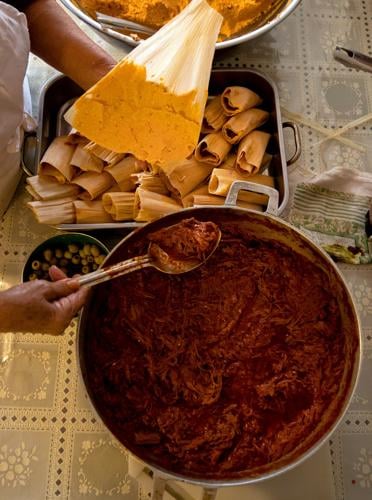PHOENIX — State lawmakers will move Tuesday to do something they haven’t done in more than 40 years: Override a governor’s veto.
The bill at issue, vetoed this week by Gov. Katie Hobbs, would legalize the sale of home-cooked tamales, empanadas and other foods.
Rep. Travis Grantham, R-Gilbert, said Wednesday that he will make a motion to enact his legislation, House Bill 2509.
Republican ire at Hobbs’ vetoes is nothing new. She is now up to 63 this session.
But this veto is different because the measure has broad bipartisan support. And Rep. Alma Hernandez, D-Tucson, told Capitol Media Services she will vote to override the Democratic governor and urges colleagues to do the same, regardless of the political implications.
In the other legislative chamber, Senate President Warren Petersen said he also will try to line up the necessary votes to override, which is 20 — two-thirds of the 30 senators. Given that the legislation garnered 25 votes before going to the governor, including those of nine of the 13 Democrats who were present, he thinks he can do that.
“This legislation had a supermajority vote,” Petersen said. “Both Republicans and Democrats agreed this is good policy and in the best interest of Arizona.”
In vetoing it, Hobbs said she feared it would “significantly increase the risk of food-borne illness.”
“It fails to establish sufficient minimum standards for inspection or certification of home-based businesses, and could limit the ability of ADHS (Arizona Department of Health Services) to investigate food-borne disease outbreaks,” Hobbs said.
Supporters say it includes safeguards
But Hernandez, who is a health-care consultant and a professor of health-care policy and innovation, said the governor fails to grasp that these are voluntary purchases.
“You know when you’re buying that that item was likely not cooked in a commercial kitchen,” she said.
Hernandez also pointed out that HB2509 includes some safeguards to tighten up the sales practice — which is now going on regularly, albeit illegally.
The proposal would mandate anyone doing such home cooking to complete a food handler program from an accredited program and maintain active certification. It also would require the seller to register with the Arizona Department of Health Services.
There would be full disclosure, Hernandez noted, from the name and registration number of the food preparer, to a statement on the food label saying, “This product was produced in a home kitchen that may process common food allergens and is not subject to public health inspection.”
Hobbs’ spokesman Christian Slater did not specifically address the possibility of an override or the criticisms of her decision.
“Gov. Hobbs is committed to supporting small businesses while prioritizing the health of everyday Arizonans,” he said in a written statement. “We will continue to work in a constructive way with legislators to accomplish both those goals.”
Hernandez acknowledged that the veto by Hobbs — one of 11 issued the same day — really doesn’t change anything. She said families who need the money will continue to make these items at home and sell them to willing buyers on the street or who come to their homes.
But they do so at a risk. “Currently, you can be fined up to $500,” Hernandez said.
“And, if prosecuted for your crime of selling tamales or tortillas, you can go to jail for up to six months. People shouldn’t have to live in fear to make an honest living.”
She said this is about more than the sale of Mexican food.
Existing law already allows the sale of homemade baked goods. But Hernandez said the statutes and rules permitting that are overly restrictive.
For example, she said, it is permissible to sell cupcakes — but only if they have no frosting and are not filled.
“Come on, let’s be real,” Hernandez said. “Who would sell something on the street like just a regular piece of bread? That doesn’t happen.”
The Tucson Democrat said she reached out to the Governor’s Office after HB2509 was approved to urge Hobbs to sign it, leaving a message on the phone of Allie Bones, the governor’s chief of staff. Hernandez said there was no return call, though she conceded she didn’t say in the message why she was calling.
None of this is political, she said.
“I want everyone to understand that I am in no way attacking the governor for her other vetoes,” Hernandez said. “I’m not going after her personally. I would have done the same thing if (Republican former Gov. Doug) Ducey had done this.”
But Hernandez, first elected in 2018, did not have positive words for the 11 Democrats in the House and four in the Senate who declined to support the bill.
For some home cooks, the sales are a matter of survival, she said.
“That lady you bought tamales on, whatever corner you were on in Phoenix, she is not selling the tamales for fun,” Hernandez said. “I guarantee you, she is selling the tamales to make an honest living and be able to provide for her family.”
It’s also personal. “When my father was very ill, my mom, who is literally an educated woman from Mexico, could not work as a biochemist in Arizona when she moved here,” Hernandez said. “So what did she do? She resorted to making cakes that we would sell so we could get by.”
Last override was in 1981
The last governor to face an override also was a Democrat, Bruce Babbitt.
In 1981, he vetoed congressional and legislative redistricting plans approved by the Republican-controlled Legislature, saying they “dilute racial and ethnic minority interests in an unconstitutional and unlawful manner.” Babbitt also said Republicans were trying to undermine then-U.S. Rep. Morris K. Udall by dividing Tucson, which he represented, into two districts.
The 60-member House, with 41 Republicans at the time, had no problem getting the necessary two-thirds vote for an override.
In the Senate, Republicans controlled just 16 of the 30 seats. But they got the necessary 20 votes for override by cutting a deal with four Democrats, agreeing to preserve their rural districts in exchange for their votes.
Get your morning recap of today's local news and read the full stories here: http://tucne.ws/morning





